九年级英语上册Unit1TheChangingWorldTopic1Ourcountryhasdevelopedrapidly重点句子解析素材(新版)仁爱版
(最新)仁爱版英语九年级上册知识点汇总Unit1Topic1
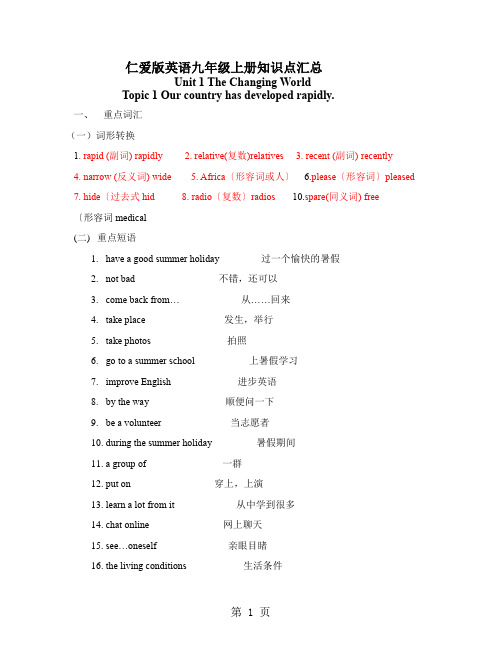
仁爱版英语九年级上册知识点汇总Unit 1 The Changing WorldTopic 1 Our country has developed rapidly.一、重点词汇(一)词形转换1. rapid (副词) rapidly2. relative(复数)relatives3. recent (副词) recently4. narrow (反义词) wide5. Africa〔形容词或人〕6.please〔形容词〕pleased7. hide〔过去式hid8. radio〔复数〕radios 10.spare(同义词) free〔形容词medical(二)重点短语1.have a good summer holiday 过一个愉快的暑假2.not bad 不错,还可以e back from… 从……回来4.take place 发生,举行5.take photos 拍照6.go to a summer school 上暑假学习7.improve English 进步英语8.by the way 顺便问一下9.be a volunteer 当志愿者10.during the summer holiday 暑假期间11.a group of 一群12.put on 穿上,上演13.learn a lot from it 从中学到很多14.chat online 网上聊天15.see…oneself 亲眼目睹16.the living conditions 生活条件17.be crowded into 挤进……里18.ring roads 环形路19.receive a good education 承受良好的教育20.keep in touch with 和…..保持联络21.lose in touch with 和…..失去联络22.in the future 在将来,在将来23.relatives far away 远方的亲戚24.work for … 为……工作25.feel sorry for… 对……深表同情26.a disabled children’s home一家残疾儿童养育院27.the reform and opening-up 改革开放28.satisfy people’s needs 满足人们的需求29.medical care 医疗护理30.what’s more 而且,更重要的是31.make great progress 获得宏大的进步32.succeed in doing sth. 成功地做某事33.remember the past 记住过去34.live in the present 立足于如今35.dream about the future 展望将来36.play an important part in 在……方面起重要作用37.get together 集会,集聚38.play hide-and-seek 捉迷藏39.play cards 打扑克40.play chess 下棋41.in one‘ s spare time 在某人空闲的时间42.chat on the Internet 在网上聊天43.in recent years 在近年来44.places of interest 名胜45.make a tour abroad 到国外旅行46.get a good education 获得良好的教育47.make progress 获得进步三、重点句型1.You have just come back from your hometown. 你刚刚从你的家乡返回。
英语九年级上册全册课文翻译(仁爱)
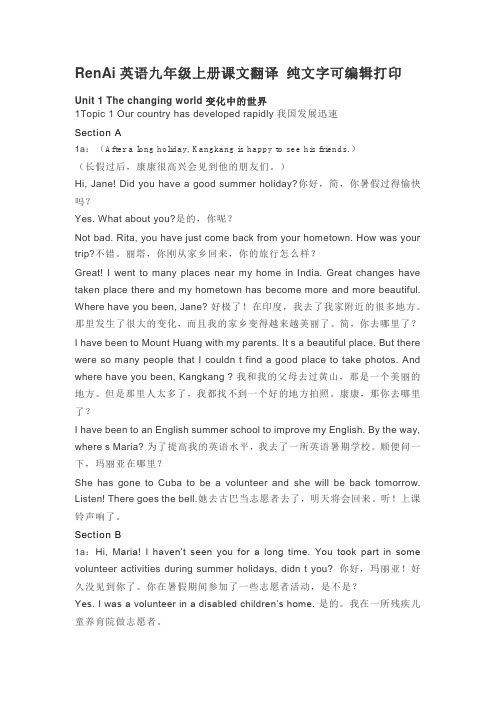
RenAi英语九年级上册课文翻译纯文字可编辑打印Unit1 The changing world变化中的世界1Topic 1 Our country has developed rapidly我国发展迅速Section A1a:(After a long holiday, Kangkang is happy to see his friends.)(长假过后,康康很高兴会见到他的朋友们。
)Hi, Jane! Did you have a good summer holiday?你好,简,你暑假过得愉快吗?Yes. What about you?是的,你呢?Not bad. Rita, you have just come back from your hometown. How was your trip?不错。
丽塔,你刚从家乡回来,你的旅行怎么样?Great! I went to many places near my home in India. Great changes have taken place there and my hometown has become more and more beautiful. Where have you been, Jane? 好极了!在印度,我去了我家附近的很多地方。
那里发生了很大的变化,而且我的家乡变得越来越美丽了。
简,你去哪里了?I have been to Mount Huang with my parents. It s a beautiful place. But there were so many people that I couldn t find a good place to take photos. And where have you been, Kangkang ? 我和我的父母去过黄山,那是一个美丽的地方。
但是那里人太多了,我都找不到一个好的地方拍照。
[精品课件]九年级英语上册 Unit 1 The Changing World Topic 1 Our country has developed rapidly Secti
![[精品课件]九年级英语上册 Unit 1 The Changing World Topic 1 Our country has developed rapidly Secti](https://img.taocdn.com/s3/m/b6acfa2fe87101f69f319514.png)
Task 2
Read for details
Unit 1 Topic 1 Section C
Have you heard of the song Seasons In The Sun ?
We’ve known each other since we were nine or ten. Together we’ve climbed hills and trees.
develop _d_e_v_e_l_o_p_e_d__ _d_e_v_e_lo_p_e_d__
succeed _s_u_c_c_e_e_d_e_d__ _s_u_c_c_e_e_d_e_d__
Let’s enjoy some old pictures of Fuling.
Some pictures of new Fuling.
Read Paragraph 2 and , using key words.
Items
The old city
The new city
Roads Houses
Read Paragraph 2 and 3
Items
The old city
3. At the end of class, everyone d_r_e_a_m_t_ _/d_r_e_a_m_e_d__a_b_o_ut__t_h_e_f_u_t_u_r_e(梦想未来).
A mind map
仁爱版九年级英语上册知识点汇总
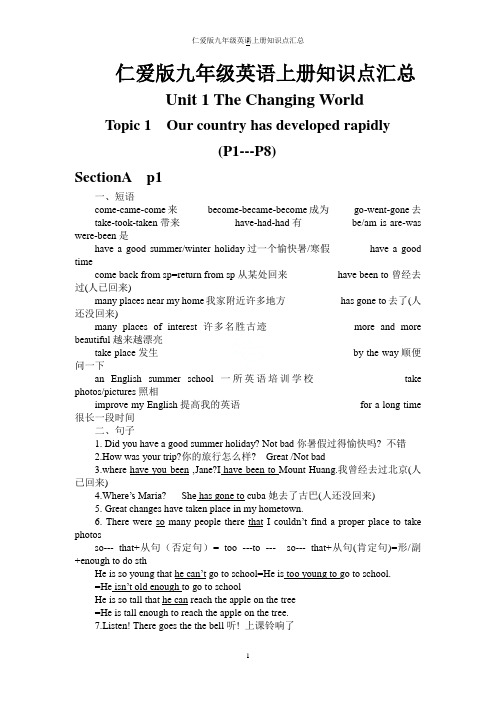
仁爱版九年级英语上册知识点汇总Unit 1 The Changing World Topic 1 Our country has developed rapidly(P1---P8)SectionA p1一、短语come-came-come来become-became-become成为go-went-gone去take-took-taken带来have-had-had有be/am is are-was were-been是have a good summer/winter holiday过一个愉快暑/寒假have a good timecome back from sp=return from sp从某处回来have been to曾经去过(人已回来)many places near my home我家附近许多地方has gone to去了(人还没回来)many places of interest许多名胜古迹more and more beautiful越来越漂亮take place发生by the way顺便问一下an English summer school 一所英语培训学校take photos/pictures照相improve my English提高我的英语for a long time 很长一段时间二、句子1. Did you have a good summer holiday? Not bad你暑假过得愉快吗? 不错2.How was your trip?你的旅行怎么样? Great /Not bad3.where have you been ,Jane?I have been to Mount Huang.我曾经去过北京(人已回来)4.Where’s Maria? She has gone to cuba她去了古巴(人还没回来)5. Great changes have taken place in my hometown.6. There were so many people there that I couldn’t find a proper place to take photosso--- that+从句(否定句)= too ---to --- so--- that+从句(肯定句)=形/副+enough to do sthHe is so young that he can’t go to school=He is too young to go to school.=He isn’t old enough to go to schoolHe is so tall that he can reach the apple on the tree=He is tall enough to reach the apple on the tree.7.Listen! There goes the the bell听! 上课铃响了8.sb have /has been to sp某人曾经去过某地(人已回来)sb have/has gone to某人去了某地(人不在说话者的地方)sb have /has been in sp某人呆在某地Section B P3Words:develop(v)----developing/developed(adj)-----development(n)发展发展中的/发达的发展/达;开发educate(v)---education(n)教育communite(v)---communication(n)交流decide(v)---decision(n) 决定feed-fed-fed喂,饲养do –did-done做shut-shut-shut关上chat-chatted-chatted聊天spend-spent-spent 花费feel-felt-felt感觉fall-fell-fallen掉learn-learned/learnt-learned/learnt学dream-dreamed/dreamt-dreamed/dreamt梦想tell-told-told告诉write-wrote-written写take part in+活动join+组织leisure /social /volunteer activities业余/社会/志愿活动be a volunteer成为一个志愿者disabled children’s home 一所残疾儿童养育院tell stories to the kids 给孩子们讲故事feed the disabled children 给残疾儿童喂饭a wonderful experience 一次精彩的经历learn a lot from sp 从…中学到许多have no time/money/chances to do sth没有时间/钱/机会做某事have no time to travel没有时间去旅行write an article about teengers/smoking/health写一篇关于青少年/抽烟/健康的文章tell sb something about 告诉某人一些关于have/live a hard /happy life过着艰苦/幸福的生活have a balanced diet 饮食均衡describe sth in detail/detailedly 详细地描述某物in the past /at present/nowadays/now/in the future过去/现在/如今/现在,此刻,/将来spend their childhood/the evening/summer holiday /spend the whole holiday度过他们的童年/过夜/度过暑假/度过整个暑假couldn’t/can’t afford the children’s education供不起孩子上学child laborers做童工in order to +V/so that+clause为了1.support their families养家糊口get a goodeducation受到良好的教育give support to sb/poor families为某人/贫困家庭提供帮助get enough food adj/adv+enough获得足够的食物day and nightdevelop rapidly迅速发展with the development of 随着…的发展I have ever---(clean rooms/jump rope/chat online/have summer classes/dofarm work)1).Have you ever taken part in any social activities?/told stories to the kids/ fed /cleaned rooms for/cooked for the disabled children? Yes, I have/No, I haven’t2)你曾经参加过一些公益活动/给孩子讲过故事/给残疾儿童喂吗?3)Though I had no time to travel, I still felt very happy.1.虽然我没有时间去旅行,但是我仍然感到很开心4)Could you please tell me something about Chinese teenagers?告诉有些有关---5)Can you describe it in detail?你能详细地描述一下吗?6)They had to be child laborers.7)They worked day and night and never had enough food to eat.8)our country/ china has developed rapidly.中国发展迅速.9)With the development of China, many things have changed, and childrencan get a good education now.随着中国的发展,---10)China is a developing country while the USA is a developed countrySection C p5Succeed(v)--- Success(n)—successful(adj)---successfully(adv)narrow-wide low-tall dark-bright slow-quick keep-kept-kept保持see sth oneself 亲眼所见/目睹see sb doing/do sththe whole city/night/family/class 整个城市/整晚/整个家庭/班级crowd in 挤在poor conditions/living conditions 条件很差/生活条件have a chance to do sth 有一个机会做某事receive a good education 接受良好的教育far away遥远by letter and telegram/by doing sth通过信件和电报keep in touch with 保持联系get in/lose touch with取得/失去联系a kinds/sorts of种类all/different kinds/sorts of clothes各/不同种类的衣服make rapid/much progress取得迅速的进not only ---but also--- 不但---而且be successful/succeed in doing sth 成功做某事dream about doing sth 展望,梦想sth happen to sb某人发生了某事sb happen to do sth 某人凑巧/碰巧做某事be like 象reform and opening-up.改革开放living conditions 生活条件working tools劳动工具communication tools通讯工具1.She has seen the changes in Beijing herself.她亲眼目睹了北京的变化2.People kept in touch with their friends and relatives far away mainly by letter or telegram.人们主要靠信件和电报与远方的亲朋好友保持联系.3.Beijing has made rapid progress and it has already succeeded in hosting the 2008 Olympic Games.北京取得如此迅速的进步.它还成功举办了2008年的奥运会.4.I think it is important to remember the past, live in the present and dream about the future.我认为记住过去,立足现在,展望未来是非常重要的5.What were Beijing’s roads like in the past?过去北京的道路什么样?6.What has happened to Beijing’s roads now adays?现在北京的道路发生了怎样的变化?7.What will Beijing’s roads be like in the future?将来北京的道路会是什么样?SectionD p7conclude(v)---conclusion(n)结论P7 1.There is a very popular organization for young people in our community. I joined it two years ago. And I have taken part in many interesting activities. What we have done can not only help others but also make ourselves happy.Last Sunday, we went to an old people’s home. After helping them do some housework, we sang, danced and played games with them. The old people were excited at our visit. They told us interesting stories about themselves. We all had a good time.After this visit, my friend and I decided ti do more things to help them. Now more than 30 volunteers have joined our club. Everyone thinks the experience is wonderful.watch a movie in the open air/in the movie theater观看露天电影/电影院watch TV at homego roller skating/skiing/swimming/shopping/boating/fishing/climbing滑旱冰、滑雪游泳购物划船钓鱼登山Play hide-and-seek/computergames/basketball/football/baseball/table tennis/tennis/volleyball玩捉迷藏电脑游戏打篮球足球棒球乒乓球网球排球play the piano/the guitar/violin/the drums弹钢琴吉他小提琴打鼓fly kitesbe popular with 在---之间收欢迎write a composition写一篇作文an example of an outline一个示例提纲follow these ste遵循这些步骤consider sth carefully 仔细思考. draw up拟定,起草check over检查with the help of在----帮助下thanks to多亏,由于thank you/thanks for doing sth 因…而感谢你语法:现在完成时:p118表示开始于过去并持续到现在的动作或状态./表示过去发生或已经完成的某一动作对现在造成的影响后结果.结构: 肯定句:主语+have/has+动词的过去分词:Now our country has developed rapidly否定句: 主语+haven’t/hasn’t+动词的过去分词: I haven’t seen him for a long time一般疑问句:Have/Has+主语+动词的过去分词: Have you ever fed them?Yes, I have. No, I haven’t特殊疑问句:疑问词+ have/has+主语+动词的过去分词:Where have you been?时间状语: already已经/肯定句,yet还/仍然/(否/疑问),ever曾经(肯/疑), never从来不,just刚刚/位与谓语前),before以前(位于句末),since+从句(一般过去时)/过去的时间点,自从---以来, for+一段时间,长达since ,for划线用how long 提问肯定句:I have already done my homework一般疑问句:Have you done your homework yet? Yes, I have. No, I haven’t否定句:I haven’t done my homework yet.特殊疑问句:what have you done for the old people?I have just come back from my hometown.=I have lived here for 10 yearswritten:(1) The different lives of Chinese teenagers中国青少年的不同生活.P4 2cIn the past,children had little food to eat and few warm clothes to wear. Most of them had no chance to go to school because they were poor. And they had very few leisure activities. They had to work and help support their families.With the development of China, all those things have changed. Nowadays, children have a balanced diet and can wear different kinds of clothes. They can also get a good education. what’s more,they enjoy more kinds of leisure activities, like drawing, singing, playing musical instruments and receiving some other training.(2)Changes in Li Ming’s Hometown P8Changes in living conditions/working tools /communication tools /education 生活条件/劳动工具/ 通讯工具/教育的变化Li Ming’s hometown has changed a lot in the past few years. In the past, people’s living conditions were poor. A big family was crowded in a small low house. People usually planted crops with the help of farm animals. And the children studied in an old school. Since the reform and opening-u[, his hometown has developed rapidly and great changes have taken place in the living conditions. People live in tall bright buildings. Machines have already taken the place of farm animals and the work in the fields has become much easier. What’s more, children now study in a modern school.Thanks to the government’s efforts, Li Ming’s hometown is becoming better and better.(3)Changes in my /our hometown/My report on Beijing我家乡的变化/我的有关家乡的报告过去:房子旧,小,河:脏,道路:狭窄,生活条件:艰辛,交通工具:上班走路或骑自行车现在: 房子:高楼大厦,住房宽敞,明亮,河:清澈,道路:环形路,生活条件:舒服,交通工具:上班,许多人都有小车或搭公交Unit 1 Topic2九年级上China has the largest population(P9---P10)SectionA p91.学习现在完成时跟just, already, yet, ever, never, before,so far连用2 so/neither引导的倒装句 3.谈论有关人口问题一:Words: Adj------------------------advEurrope(n)---European(adj) 欧洲的probable-----probably 可能,大概recent -----------recently 近来的最近的great----------greatly巨大地,大大的n------adj------advluck------lucky-------luckily difficulty-----difficult------difficultly幸运地,运气好地困难,费力二:keywords:policy/percent/excellent/control/population/unless/offer/increase/relation/neither 三:phrases:1.call sb/telephone sb/ring sb up打电话给某人2.a boy called/named/with the name of Kangkang is my student一个叫做---的男孩3.too many+n(pl) / people too much +Un/water much too+adj/fat太多太多十分,太,很4.hate to go shopping 讨厌去购物hate/like to do/doing sth shopping center 购物中心5.肯定句:so + be /助v+/情态v +另一个主语“也”前者(肯定句)情况也适合后者“A 如此, B也如此”6.否定句:neither+ be /助v+/情态v+另一个主语“也”“A 如此, B也如此”7.so +主语+be /助v+/情态v “的确如此”对前面所说的情况进行肯定:“A 如此, A的确如此”8.so+adj+a/an+n(单)=such+a/an+adj+n(单)so beautful a country=such a beautiful country如此美丽的国家so+ 形+ that+从句such+形+名+that+从句如此---以至于---9.in those days那时候at that time在那时用一般过去时10..It seem(s/ed) that +从句=sb seem(s/ed) to do/be+adj 似乎,好象It seems that he knows it=He seems to knows it11.a least/at most至少/多at last 最后12.well developed/develop a lot/quickly/slowly less developed发展很好/许多/很慢不发达impove rapidly/a lot 改善/提高很快/许多13.take place/happen/举办/发生,碰巧,刚好sth happen to sb/sth某人物发生了某事sb happen to do sth某人碰巧做某事The Olympics takes place every four years (必然性)I happen to meet an old friend of mine in the street(偶然性)14.because of +n because+从句因为15.the one—child policy独生子女政策the only one child独生子女16.used to be +adj 过去常常--- used to be /+a/an+n 过去是一个---used to do sth过去常常做---17.be/get used to doing sth习惯于做某事18.be strict with sb/in sth对某人/某事要求严格Sentences:(A)1.I have just called you,2. .He has probably gone home. Let3.I really hate to go shopping--------so do I-------- 我也是4. It seems that their living conditions were not very good似乎他们的生活条件不好5. At that time, China had the largest population in the world and it was notwell developed.6. But great changes have taken place in china recently.7.China has developed a lot already.8. Because of our country’s one-child policy, now most families have only one child =Because our country has the one-child policy, now most families have only one child.由于我国实施独生子女政策,现在大多数家庭只有一个.孩子9.No one likes “Little Emperors”--------Neither do my parents没人喜欢小皇帝---我父母也认为这样不好10 They are very strict with me 他们对我非常的严格SectionB p111.学习What’s the population of---?结构2.高位数字表达法3. 谈论世界各国人口1.a report about 一篇关于---的报告2.the population of---- ---的人口the population of the world/chinaThe world has a population of 6.5 billion=The population of the world has 6.5billion.3.the (second) largest population人口最(第二)多问人口:What’s the population of china? It’s about 1.3 billion.How many people are there in china?What’s the number of people in china?China has the largest population in the world, with 1.3 billion.China is a large population country in the world, with 1.3 billion.India is second with 1.1 billion.= India has the second largest population, with 1.1 billion.increase by 增加了--- increase to 增加到4.grow fast/slowly增长快/慢what’s more ,the population in developing countries is growing faster.----so it is而且,发展中国家人口增长很快5.developing countries 发展中国家developed countries发达国家It shows that the population in developing countries is larger than that in developed countries, doesn’t it?它显示发展中国家人口比发达发国家人口多,是吗?6.a serious problem more/most serious更/最为严峻7.carry it/them out实行control the population控制人口Luckily, China has already carried out the one-child policy to control the population.幸运的是,中国已经实行了独生子女政策来控制人口.2.P11 1b;What’s the population of---P12 2b China had a population of 1.3 billion in 2005.It’s about 6 575 miles from Beijing to Toronto.Mount Qomolangma is 8 844.43 meters high.The population of Canada was about 32 million in 2005.The dinosaur lived 210 million years ago.Section C p131.谈论人口增长带来的问题,树立正确的人口观念1.the world’s population more than /over 多于,超过less than少于2.one fifth/two fifths五分之一/二 a quarter=one fourth 分基母序,half =one/a second=50percent four and one half 分子>1,分母+s Three fifths of the students have passed the exams.几分之几的---One half of the bread goes bad because of bad weather.3.less living space 更少的居住空间the whole nation整个国家whole着眼于整体whole +n(单数),谓语用单三形式all+(n)复数/Un,着重于全体中的各个部分The whole family likes watching. The whole week has passed quickly.All the people in the ship lost their lives.4.be short of 短缺she is always short of money.be short of---是---的缩写for short简称,简写Tv is short of television=we call television Tv for short.5.be difficult for sb to do sth做某事对某人来说有困难have difficulty in doing sth做某事有困难6.more crowded 更拥挤7.so far到目前为止8.take measures to do sth /control the population采取措施做某事9.be known as/be famous as以---出名/著名,众所周知Edison was famous as a great scientist.She is well known as an excellent teacher.be famous/known for+原因表特点,特长的名词The film star is famous for her fine actingThe mountain is famous/known for its beautiful scenery.10.11.Work out算出work on 从事---工作12.prefer( doing)sth to (doing)sth喜欢---胜过---13.offer sb sth=offer sth to sb提供给某人某物offer sb a good education某人良好的教育offer to do sth主动提出做某事14.deal/do with1.China has the largest population in the world .中国是世界上人口最多的国家.2.we are short of energy and water。
九年级英语上册 Unit 1 The Changing World Topic 1 Our country has developed rapidly Section D课件 (

abroad adv. 在国外,到国外
go abroad 去国外
at home and abroad 国内外
13
1b Read 1a and answer the following questions.
1. When do people usually have their leisure activities?
10
Retell 1a according to the table.
1. Leisure activities play an important part in people’s lives. 休闲活动在人们的生活中起着重要的作用。
play a/an… part = play a/an… role
A. Many. B. Little. C. None. D. Few.
2. Kids often got together to ______.
A. play cards
B. listen to the radio
C. play hide-and-sEeevkaluaDti.opnlayognalym.es on computers
To help others makes us happy. make sb./sth. + adj.
make sb./sth. do sth. I think it is important to remember the past, live
in the present and dream about the future.
B. Because they have time and chance.
C. Because they don’t want to work.
湖南省耒阳市九年级英语上册Unit1TheChangingworldTopic1Ourcountry

The Cha ngi ng World教师寄语:A waste of their time is slow suicide, wasting people's time isthe murder.(浪费自己的时间是慢性自杀,浪费别人的时间是谋财害命。
)Class _______ Grade9 Group _________ Name ____________课型:预习+展示课Title: Unit 1 The Cha ngi ng world (正在变化着的世界)Topic 1 : Our country has developed rapidly.(我们的国家发展迅速。
)Sectio n: A 1a-3 (P1-2)两课时Learning steps (学习过程):一、抽■反(Check before class )(5')(我会做)1 •汉译英并写出单词的音标及词性,然后熟读。
1)志愿者()/ ______ /2)钟声,铃,钟(_____ )/ /3)非洲()/ ________ /4)发生,进行()二、学习目(Learning target )(1')1 .学习新单词及短语:volu nteer, bell, Africa, take place ;2 •学习并背诵1a的对话;3.初步了解现在完成时的构成并能区别J have /has been to 和have / has gone to 的用法;4 •熟读并背记下面重点句型:1) ---Where have you bee n , Jane?---1 have bee n to Mount Huang with my pare nts .2) ---Where have you bee n, Kan gka ng?---I have bee n to an En glish summer school to improve my En glish.3) --- Where ' s Maria?---She has gone to the library.1..熟记新单词及词组;2. 掌握由sb. have /has been to 某人去过…(去而复返)和sb. have / has gone to某人去了(去而未归)的用法。
九年级英语上册 Unit 1 The Changing World Topic 1 Our country has developed rapidly Developing Countr

Developing CountryA developing country is a country which has an undeveloped or developing industrial base, and an inconsistent varyi ng Human Development Index (HDI) score and per capita income, but is in a phase of economic development. Usually all countries which are neither a developed country nor a failed stat e are classified as developing countries, despite the above facts, this is not true for all countries as some developing countries are far more developed than some developed countries.Co untries with more advanced economies than other developing nations, but which have not yet fully demonstrated the signs of a developed country, are grouped under the term newly industrialized countries. Other developing countries which have maintained sustained economic growth over the years and exhibit good economic potential are termed as emerging markets. The Big Emerging Market (BEM) economies are Argentina, Brazil, China, Egypt, India, Indonesia, Mexico, Poland, Russia, South Africa, South Korea and Turke y. The application of the term developing country to any country which is not developed is inappropriate because a number of poor countries have experienced prolonged periods of economic decline. Such countries are classified as either least developed countries or failed states.Development entails a modern infrastructure (both physical and institutional), and a move away from low value added sectors such as agriculture and natural resource extraction. Developed countries, in comparison, usually have economic systems based on continuous, self-sustaining economic growth in the tertiary and quaternary sectors and high standards of living.。
仁爱英语九上知识点总结

Unit 1 The Changing WorldTopic1 Our country has developed rapidly1.重点短语:我的家乡发生了巨大的变化Great changes have taken place in my hometown.与汉语语序不同.可不可以变为My hometown has taken place great changes?答:不能,因为take place 是不及物动词,不能接宾语,而my hometown不是动作发出者,不能作主语,应作地点状语.Happen 也是不及物动词考考你:昨天这里发生了一场交通事故。
Yesterday a traffic accident happened here.(1)Take place与happen的区别Take place(尤指根据安排或计划)发生,进行Eg:Great changes will take place in this town in the near future.Happen(尤指偶然)发生,出现Eg: The traffic accident happened last Friday.拓展:take the place of sb/sth= take sb’s/sth’s place 代替Eg: I have to find someone to take Jenny’s place。
She’s badly ill。
(2)have/has been to 与have/has gone to的区别(不能与表示一段时间的时间状语连用)have/has been to some place“去过某地,现在人已返回"eg: ———Where have you been, Jane?———I have been to Beijing with my parents。
have/has gone to some place“去了某地,可能在某地或者去某地的路上,总之不在说话现场" eg:---Where is your father?--—He has gone to London。
九年级英语上册Unit1TheChangingWorldTopic1Ourcountryhasdev

KaEnxagmkaplneg: hasMbaRJeareiintanaehthoaaasssabngbeoeeEnennentgotliosMhCIonsudunbimata.H.muearnsgc.hool.
Cuba
Rita has been to India. Jane has been to Mout Huang. Kangkang has been to an English sunmmer school.
Kangka ng
aCnubEa nglish ______ school
Maria
has gone _____ to be a to volunteer
herh_om__et_o_w_n___ has become morbeeaauntidful more _________ it is beaupetiofupllebut there were too many __im_p_r_o_ve_
They were back.
Maria has gone to Cuba. She didn't come back.
have/has gone to ... 去了某 地(未回来)
Michael: Hi, Maria, long time no see. Where __h_a_v_e_ you _b_e_e_n__?
B 4. He got up ______ late ______ he was late for work today.
A. such...as
B. so...that
C. very... that D. too...to
See you!
A. have taken place B. take place C. have happened D. happened
九年级英语上册 Unit 1 The Changing World Topic 1 Our coun

Homework
1. Read 1a aloud.
2. Make sentences with have/has gone to... and have/has been to... 3. Finish Section A in your workbook. 4. Preview Section B.
Jane
Kangkang
Maria
and she will be back tomorrow ___________
1c Retell the main information of 1a based on 1b.
Key phrases and expressions:
How was your trip? 1. 你的旅行如何? _________________
THANK YOU!
A. has been to
C. have been to
B. has gone to
D. goes to
A 2. Great changes ______ in my hometown.
A. have taken place
C. have happened
B. take place
D. happened
1b Listen to 1a and complete the table.
places near many _______ India the home in ______ Mount ________ Huang has been to with her _________ parents summer an English _______ school Cuba to be a ______ has gone to volunteer
仁爱版九年级英语上Unit one The Changing world Topic 1 Our country has developed rapidly Section A
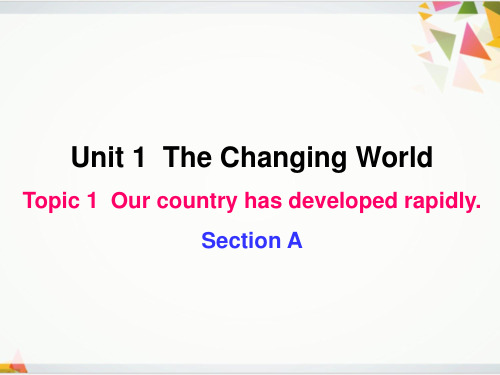
Mount Huustralia Africa London America
2a TLhisetennetoxtthedcaoyn,vMersaartiiaoncaanmd feillbinatchke .blSanhkes.mTheetn practice it withMyoicurhpaaertlneirn. the school.
I __h_a_v_e_f_in_i_s_h_e_d_ my English homework. 她已做好了晚饭。 Sheh_a_s__c_o_o_k_e_d the dinner.
Read these aloud:大声读、背(准备默写) 1.从、、回来: come back from…. 2. 发生: take place 3.如此多的人: so many people 4.如此多的钱: so much money 5.找到一个好地方: find a good place 6. 提高我的英语: improve my English 7.去过某地: have/has been to sw 8.去了某地: have/has gone to sw 9. 顺便提一下:by the way 10. 铃声响了: There goes the bell.
Read 1a by yourselves again.
1a Listen,look and say.
Can you find out the following sentences and
understand them? 1.You have just come back from your hometown.
1.他们去过上海。Thheya_v_e_ b_e_e_ n__toShanghai. 2.她去了上海。She _h_a_s_ g__o_n_e_t_o__Shanghai.
仁爱英语九年级上册Unit1-topic1知识点总结

仁爱英语九年级上册知识点归纳Unit 1 The Changing WorldTopic1 Our country has developed rapidly.一、重点短语1.be happy/glad/pleased to do sth. 很高兴做某事2.not bad 还不错e/go/be back 返回4.take place 发生5.by the way 顺便说一下,顺便问一下6.have/has gone to去了某地(还没有回来)Have/has been to 去过某地(已经回来)7.learn from…从……学习8.have no time/money to do sth. 没有时间/钱做某事9.put on 穿上,上映10.in the past 在过去11.at present 现在12.see sth. in person see sth. oneself see sth. with one’s own eyes亲眼目睹13.in the 1960s 在20世纪六十年代14.the living conditions 生活条件15.have a chance/chances to do sth. 有机会做某事have no chance to do sth. 没有机会做某事16.receive/have/get a good education 接受好的教育17.keep in touch with sb. 与某人保持联系get in touch with sb. 与某人取得联系 lose touch with sb. 与某人失去联系18.far away 遥远的 far away from…距……遥远19.the reform and opening-up 改革开放20.since+时间点/时间段ago/一般过去时的从句 for+时间段21.be pleased/satisfied with…对……感到满意22.satisfy one’s needs满足某人的需求23.on the Internet在网上24.make rapid progress 取得快速的进步25.succeed in doing sth. 成功做某事26.play an important part/role 扮演一个重要的角色27.in one’s spare/free time在某人的空闲时间29.places of interest/ interesting places 名胜古迹30.though/although/even though/even if 虽然,尽管,即使引导让步状语从句,不与but连用,但可与still,yet连用。
九年级英语上册 Unit 1 The Changing World Topic 1 Our cou
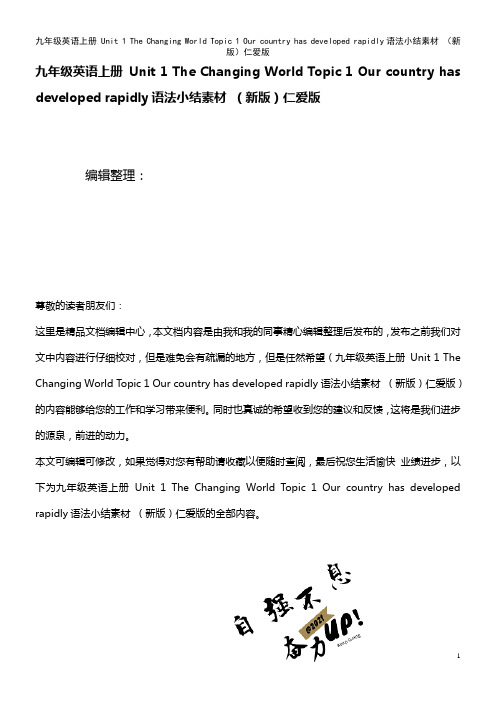
九年级英语上册Unit 1 The Changing World Topic 1 Our country has developed rapidly语法小结素材(新版)仁爱版编辑整理:尊敬的读者朋友们:这里是精品文档编辑中心,本文档内容是由我和我的同事精心编辑整理后发布的,发布之前我们对文中内容进行仔细校对,但是难免会有疏漏的地方,但是任然希望(九年级英语上册Unit 1 The Changing World Topic 1 Our country has developed rapidly语法小结素材(新版)仁爱版)的内容能够给您的工作和学习带来便利。
同时也真诚的希望收到您的建议和反馈,这将是我们进步的源泉,前进的动力。
本文可编辑可修改,如果觉得对您有帮助请收藏以便随时查阅,最后祝您生活愉快业绩进步,以下为九年级英语上册Unit 1 The Changing World Topic 1 Our country has developed rapidly语法小结素材(新版)仁爱版的全部内容。
Unit1 Topic1 语法小结本话题主要语法项目—现在完成时(I)现在完成时表示动作发生在过去,强调对现在造成的影响或结果。
现在完成时的构成:助动词have/has +动词的过去分词。
如:-Where have you been, Jane?简,你去哪里了?—I have been to Mount Huang with my parents.我和父母去了黄山。
“have/has been to"表示曾经去过某地(现在不在那里了),后面可接去过某地的次数,如once, twice, three times 等。
如:Jane's father has been to Hongkong three times。
简的爸爸去过三次香港。
【链接】(1)“have/has gone to”表示已经去了某地了(现在还没有返回)。
科普仁爱英语九上《Unit 1 The Changing WorldTopic1 Our country has developed rapidly Section D》
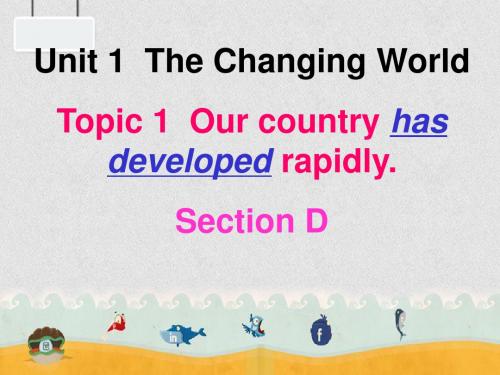
play games computers
on 在电脑上玩游戏
不要玩太多电脑游戏。
Don't play too many games on computers.
chat on the Internet
在互联网上聊天
make a tour abroad 到国外旅游
在过去抓泥鳅是 我们的休闲活动之一
P7 Changing Leisure Activities
改变中空闲活动
What are leisure activities?
Leisure activities are the kinds of things people like to do to relax and enjoy themselves when they are not working or going to school.
watch operas
看戏剧
在20世纪80年代 看戏剧是很有趣的事情。
It ‘s great fun to watch operas in 1980s.
listen to the radio
听收音机
At present 目前
since the reform and opening-up.
自从
play cards
打牌
我有时候喜欢和我的家人打牌。
Sometimes I like playing cards with my families.
play chess
下象棋
我有空的时候就和 爸爸下棋。
I play chess with my father when I am free /in my spare time.
- 1、下载文档前请自行甄别文档内容的完整性,平台不提供额外的编辑、内容补充、找答案等附加服务。
- 2、"仅部分预览"的文档,不可在线预览部分如存在完整性等问题,可反馈申请退款(可完整预览的文档不适用该条件!)。
- 3、如文档侵犯您的权益,请联系客服反馈,我们会尽快为您处理(人工客服工作时间:9:00-18:30)。
Unit1 Topic1 重点句子解析
【1】There goes the bell.铃响了。
(教材P1)
这是一个完全倒装句,当主语是名词时,要把主语放在谓语动词之后。
如:
Here comes the bus.车来了。
当主语是代词时用局部倒装句,即把主语放在谓语动词之前。
如:.
Here they are.他们在这。
Here they come.他们来了。
【2】I was a volunteer in a disabled children’s home.我曾是残疾儿童之家的一名志愿者。
(教材P3)
disabled 意为“残疾的,残废的”。
如:
The shop sells all kinds of facilities for disabled people.
这家商店卖各种各样的残疾人使用的设施。
【拓展】disable 意为“使丧失能力,使伤残”。
如:
He was disabled in a car accident.
在一场车祸中他变残疾了。
【3】Though I had no time to travel, I still felt very happy. 虽然我没有时间去旅行,但是我仍然感到很开心。
(教材P3)
1)though/although为连词,意为“虽然,尽管,即使'引导让步状语从句,不能与but连用。
如: Though/Although my son is only nine years old, he knows a lot.
虽然我的儿子只有九岁,但是他懂得很多。
2) have no time to do sth.意为”没有时间做某事”。
动词不定式在句中作定语修饰time。
如:
I have no time to have breakfast.
我没有时间吃早饭了。
She has no time to wait for you.
她没有时间等你了。
【4】To help others makes us happy.帮助别人让我感到开心。
(教材P3)
当动词不定式作主语时,谓语动词用单数。
如:
To love and to be loved is the greatest happiness in the world.
爱人和被人爱是这个世界上最大的幸福。
动词不定式在句中作主语时,如果不定式短语较长,为了避免头重脚轻,常用it作形式主语。
如:
To hear your voice is so nice, s It’s so nice to hear your voice.
听到你的声音真高兴。
【5】Few children had the chance to receive a good education. 几乎没有孩子有机会接受良好的教育。
(教材P5)
few为形容词,意为“不多的,很少的,几乎没有”(表示否定)。
如]:He has few good friends,so he feels lonely.
他乎没有好朋友,因此他感到孤单。
【链接】a few(表示肯定)意为“几个的,有些”。
如: I have a few friends.我有几个朋友。
Education 意为“教育”,receive/have/get an education均意为“接受教育”。
【拓展】educate动词 educated形容词
【6】She has lived in Beijing for more than forty years.她已经住在北京40多年了。
(教材P5)
现在完成时通常和for引导'的表示一段时间的状语连用。
如:
I have taught in this school for ten years.
我已经在这所学校教书10年了。
More than意为“多于……,超过……”,相当于over。
如:
There are more than five hundred students in the hall.大厅里有500多名学生。
【7】She has seen the changes in Bering herself. 她亲眼目睹了北京的变化。
(教材P5)
see sth. oneself意为“某人亲眼所见”。
如: I saw him playing basketball on the playground myself. 我亲眼看见他正在操
场上打篮球。
I have seen everything myself.
我亲眼目睹了一切。
'
【拓展】see...in person/with one’s own eyes 意为“亲眼所见”。
【8】People kept in touch with their friends and relatives far away mainly by letter or telegram. 人们主要通过信件或电报和他们远方的朋友和亲属保持联系。
(教材P5)
1)keep in touch with sb. 意为“与……保持联系”。
如:
Are you keeping in touch with your classmates all the time?你一直和你的同学保持联系吗?
2)far away作后置定语,意为“远的,遥远的”,修饰前面的名词。
3)by在这里表示方式。
如:
The house is heated by gas.
这个房子是用煤气供暖的。
【9】Children can study not only in modern schools but also on the Internet. 孩子们不仅可以在现代化的学校里学习还可以在互联网上学习。
(教材P6)
not only...but also...意为“不但……而且……”,
连接两个并列成分。
当连接主语时,谓语动词形式与 but also后的主语保持一致,即就近原则。
如:
She is not only our teacher but also our friend. (连接表语)
她既是我们的老师,也是我们的朋友。
Not only the students but also the teacher is going to the Great Wall.(连接主语)不但同学们去长城,老师也要去。
She speaks not only English but also French.(连接宾语)
她不仅说英语,也说法语。
【10】Bering has made rapid progress and it has already succeeded in hosting the 2008 Olympic Games. 北京已得到快速的发展,还成功地举办了2008年奥运会。
1) make progress意为“取得进展,取得进步”。
如: Study hard, and make progress every day.
好好学习,天天向上。
【拓展】make progress in/with( doing) sth. 意为“在……(方面)取得进步”。
如:We have made great progress in controlling inflation. 我们在抑制通货膨胀方面取得了巨大进展。
2) succeed in (doing) sth. 意为“在……(方面)成功”。
如:
He succeeded in getting a place at an art school. 他被艺术学校录取了。
【拓展】success名词,successful形容词, successfully 副词。
【11】 What has happened to... nowadays? 现今……情况怎么样?
happen意为“发生;恰好”。
不及物动词,不能用于被动语态,happen to sb./sth.意为“事情发生在……身上,降临到……头上”。
事件作主语。
如: An accident happened to me yesterday.昨天我出了一点意外。
happen to do sth.意为“碰巧/凑巧做某事”。
如:I happened to have read this article.我恰巧读过这篇文章。
【链接】take place意为“发生”。
指某事按照预定计划或安排发生,不含偶然之意。
Great changes have taken place in my hometown. 我的家乡发生了巨大的变化。
